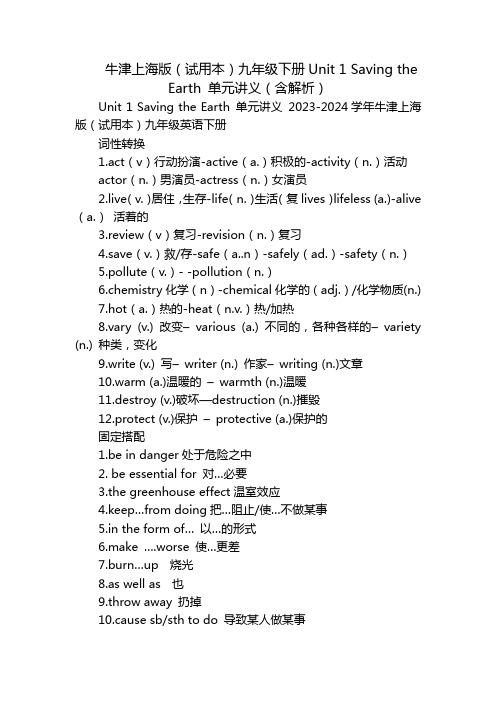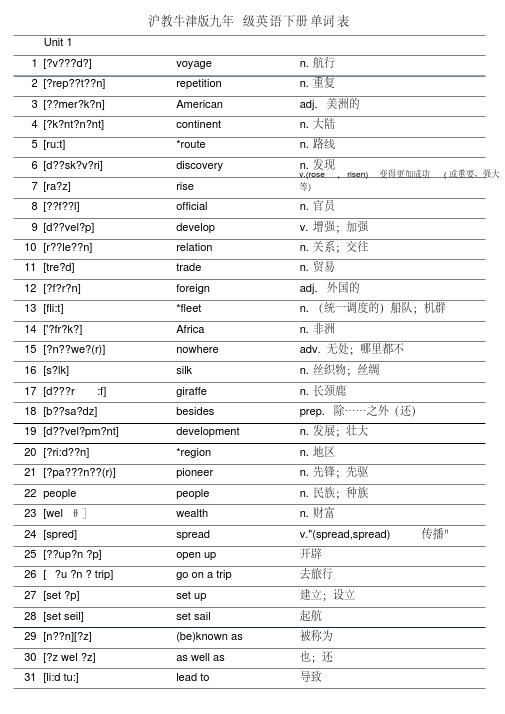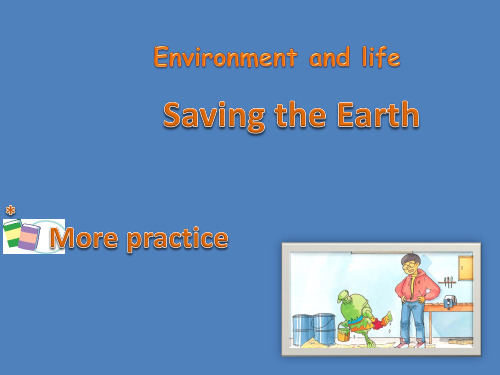牛津上海版英语九年级下册 U1Speaking
牛津上海版(试用本)九年级下册Unit 1 Saving the Earth 单元讲义(含解析)

牛津上海版(试用本)九年级下册Unit 1 Saving theEarth 单元讲义(含解析)Unit 1 Saving the Earth 单元讲义2023-2024学年牛津上海版(试用本)九年级英语下册词性转换1.act(v)行动扮演-active(a.)积极的-activity(n.)活动actor(n.)男演员-actress(n.)女演员2.live(v.)居住,生存-life(n.)生活(复lives)lifeless (a.)-alive (a.)活着的3.review(v)复习-revision(n.)复习4.save(v.)救/存-safe(a..n)-safely(ad.)-safety(n.)5.pollute(v.)- -pollution(n.)6.chemistry化学(n)-chemical化学的(adj.)/化学物质(n.)7.hot(a.)热的-heat(n.v.)热/加热8.vary (v.) 改变–various (a.) 不同的,各种各样的–variety (n.) 种类,变化9.write (v.) 写–writer (n.) 作家–writing (n.)文章10.warm (a.)温暖的–warmth (n.)温暖11.destroy (v.)破坏—destruction (n.)摧毁12.protect (v.)保护–protective (a.)保护的固定搭配1.be in danger处于危险之中2. be essential for 对…必要3.the greenhouse effect温室效应4.keep…from doing把…阻止/使…不做某事5.in the form of…以…的形式6.make ….worse 使…更差7.burn…up 烧光8.as well as 也9.throw away 扔掉10.cause sb/sth to do 导致某人做某事11. so that 为了12.prevent…from doing 阻止某人做某事13.the whole country 整个国家14. ask sb. To do 要求某人做某事15.for example 例如16. such as例如17.above the ground 在地面上方18.deal with 处理19.environment friendly goods 环保的物品20.live a better life 过着更好的生活翻译1. 情况非常严重以至于我们必须要做点什么来拯救地球。
九年级英语下册 Unit 1 Asia(一)讲义 (新版)牛津版-(新版)牛津版初中九年级下册英语试

Asia(一)重难点精讲It’s tiring to climb the steps and my feet hurt.tiring adj. (事、物)令人疲劳的,使人厌倦的tired adj. (人)感到疲劳be ________ of 对……感到厌烦It’s _________ for me to walk for 30 minutes.It was a ________day and she felt very _______.类似的形容词有:amazing/amazedexciting/excitedboring/boredinteresting/interested题一:翻译:我讨厌天天待在家里做作业。
step n. 台阶,步骤请小心台阶!Being honest is the first ______if you want to make friends with others.v. 踩I’m sorry to _____ on your foot.There’s still a long way to go.句中to go 是动词不定式做定语。
1. He is always the first person ___________ (e) and the last one _______ (leave).2. There are many interesting books _________ (choose) from, but I don’t know which to borrow.3. There is nothing ______________ (worry) about.题二:翻译:1.一个会见朋友的好地方。
2.我想找一个能互相聊天的人。
go on to do sth.一事做完,接着做另一件事go on doing sth.事情暂停后继续做;一直做某事题三:1)After a short break ,he went on _________(read) the rest of the text.2)After reading the novel, he went on _________(write) an article.used to do sth. 过去常做某事,现在不了be used to (doing) sth. 习惯于某事或习惯于做某事get/bee used to (doing) sth. 变得习惯于某事或习惯于做某事,往往含有“克服困难去适应”之意。
牛津上海版英语九年级第二册M1U

The student should be able to apply key vocabulary and grammar knowledge in career settings, such as understanding professional documents, writing reports, and participating in meetings.
03
reading comprehension
Overview of Reading Materials
文章主题
本单元的阅读材料主要围绕“保护环境”这一主题展开, 涉及全球气候变化、环境污染和可持续发展等议题。
文章类型
阅读材料包括一篇说明文和两篇议论文,其中说明文介绍 了全球气候变化的背景和影响,议论文则探讨了政府和企 业应如何应对气候变化和环境污染问题。
02
Vocabulary and Grammar
Key vocabulary
Listening
The student should be able to understand and identify key vocabulary related to the topic of the unit.
Analysis of Listening Skills
沪教版牛津英语【初三下册】Unit 1 Great explorations知识讲解

Unit 5 China and the World精讲精练词汇精讲1. introduce(1)introduce表示“介绍”时,主要用于介绍两个不认识的互相认识,或是向听众或观众宣布并介绍演讲者或广播、节目等的细节。
例如:Allow me to introduce my wife. 让我介绍一下,这是我太太。
It is my pleasure to introduce tonight’s speaker.我很荣幸来介绍今晚的演讲者。
(2)introduce习惯上不带双宾语,如果要表示把某人介绍给另一人,可用introduce…to…这样的结构。
汉语中的“作自我介绍”,英语用introduce oneself。
例如:Let me introduce my friend to you.(正)Let me introduce you my friend.(误)让我把我的朋友介绍给你。
Permit me to introduce myself. 请允许我介绍自己。
2. lie in(1)lie in表示“位于,坐落于……”,后常接大的地点。
根据后面地点不同,也可以用lie at…,lie on…。
例如:The city lies in the north of China. 那座城市位于中国的北部。
A temple lies on the top of the mountain. 一座寺庙位于山顶之上。
(2) lie作动词,还意为“平躺”,lie的现在分词形式是lying,过去式和过去分词分别为lay和lain。
例如:I found him lying on the ground. 我发现他躺在地上。
【拓展】(1)lie作动词时,也可意为“撒谎”,过去式和过去分词是规则的,均为lied。
lie也可用作名词,意为“谎言”。
例如:Don’t lie to me.不要向我撒谎。
(2)英语中,部分以-ie结尾的动词的-ing形式必须改ie为y再加-ing。
沪教版九年级(初三)英语下册Unit 1 Great explorations(Speaking)_课件1

Asking for repetition
Listen and answer the questions: When Doris didn't hear what Tony learnt in today's History lesson, what did she say? Sorry, could you repeat that, please? When Doris didn't hear what Zheng He traded in his voyages, what did she say? Sorry, I didn't quite catch you. You said he traded gold, silver and …?
Unit 1 Great explorations
(Speaking)
Objectives 1. To learn to ask for repetition 2. To learn to talk about a famous
explorer
What should you say when you didn't hear what people said just now?
Let's see which group does the best.
1. Role play the conversation in groups; 2. Role play the conversation in front of the class.
如何请求他人重复? 1.I beg your pardon. Did you say…? 2.Sorry, could you repeat that, please? 3.Sorry, I didn't quite catch you. You said …? 4.What did you mean by …?
沪教牛津版九年级上下英语单词表

Unit 11[?v???d?]voyage n.航行2[?rep??t??n]repetition n.重复3[??mer?k?n]American adj.美洲的4[?k?nt?n?nt]continent n.大陆5[ru:t]*route n.路线6[d??sk?v?ri]discovery n.发现7[ra?z]rise v.(rose,risen)变得更加成功(或重要、强大等)8[??f??l]official n.官员9[d??vel?p]develop v.增强;加强10[r??le??n]relation n.关系;交往11[tre?d]trade n.贸易12[?f?r?n]foreign adj.外国的13[fli:t]*fleet n.(统一调度的)船队;机群14['?fr?k?]Africa n.非洲15[?n??we?(r)]nowhere adv.无处;哪里都不16[s?lk]silk n.丝织物;丝绸17[d???r ɑ:f]giraffe n.长颈鹿18[b??sa?dz]besides prep.除……之外(还)19[d??vel?pm?nt]development n.发展;壮大20[?ri:d??n]*region n.地区21[?pa???n??(r)]pioneer n.先锋;先驱22people people n.民族;种族23[wel θ]wealth n.财富24[spred]spread v."(spread,spread)传播"25[??up?n ?p]open up 开辟26[ɡ?u ?n ? trip]go on a trip 去旅行27[set ?p]set up 建立;设立28[set seil]set sail 起航29[n??n][?z](be)known as 被称为30[?z wel ?z]as well as 也;还31[li:d tu:]lead to导致沪教牛津版九年级英语下册单词表32[k?m?pe?(r)][w?e]compare…with…把……与……对比Unit 233[?k?lt?? ??k]culture shock n.文化冲击;文化休克34[k?mp]camp n.度假营35[?fa??w?:k]*firework n.烟火;烟花36[?t?:ki]*turkey n.火鸡37[??nt??n??n?l]international adj.国际的38[?d?m?t]admit v.(常指勉强)承认39[spe?(r)]spare adj.空闲的;空余的40[d??gri:]degree n.程度41[fe?l]fail v.失败;未能(做到)42[?m?n?d?]manage v.完成(困难的事);勉力完成43[??di?m]idiom n.习语;惯用语44[?evride?]everyday adj.每天的;日常的45[?ju:n?f?:m]uniform n.校服46[w?t?ev?(r)]whatever pron.任何事物;一切事物47[p??k]pink adj.粉红色的48[?p?:pl]purple adj.紫色的49[?eniwe?]anyway adv.无论如何;反正50[??spe??li]especially adv.尤其;特别51[?be?sb?:l]baseball n.棒球运动52[?ed?u?ke??n]education n.有教益的经历53[ste?t]state n.州54[?n??n?l]national adj.国家的;民族的;全国的55[?prez?d?nt]president n.总统56[v??ke??n]vacation n.假期57[??edju:l]schedule n.日程安排58[set ?f]set off使(炸弹等)爆炸59[teik ?f]take off脱下60[?n w?nz spe?(r) ta?m ]in one's spare time在某人的空闲时间里61[tu: ? ?s?:tn di?ɡri:]to a certain degree在某神程度上62[ɡet ju:zd tu:]get used to习惯于;适应63[??nd? e? ?wee?]under the weather略有不适;不得劲Unit 364[k?n?s?:n]concern n.担心;忧虑65[??tm?sf??(r)]atmosphere n.大气层66[?tempr?t??(r)]temperature n.温度;气温67[k?n?sju:m?(r)]consumer n.消费者68[ges]guess v.猜测69[gri:n]green v.环境保护的;赞成环境保护的70[?la?fl?s]lifeless adj.无生命的;无生物生长的71[?fju:?l]fuel n.燃料72[k??l]coal n.煤73[r??z?lt]result n.结果74[?n?kri:s]increase v.(使)增长;增多75[si:][?levl]sea level n.海平面76[d??str??]destroy v.摧毁;毁灭77[?ne?t??(r)]nature n.自然界;大自然78[?s?:f?s]surface n.表面;表层79[s??l]soil n.土壤80[fl?d]flood n.洪水;水灾81[?h?b?t]habit n.习惯82[?pr?p?(r)]proper n.正确的;恰当的83[?frendli]friendly adj.无害的84[?ri:?sa?kl]recycle v.回收利用85[?p?:p?s]purpose n.目的;用途86[s??lu:?n]solution n.解决办法;处理手段87[?g?v?nm?nt]government n.政府88[r?ul ?m?d?l]role model n.楷模;行为榜样89[?ɡri:nhaus i?fekt]greenhouse effect温室效应90[in ?deind??]in danger在危险中91[?z ei ri?z?lt ?v]as a result of由于92[ri?z?lt in]result in造成;导致93['ma?nt?ns]mountains of许多;大量94[teik ??k??n]take action采取行动95[meik ? ?dif?r?ns]make a difference有作用;有影响96[?kt ?z]act as充当Unit 497[??st?r??d]*asteroid n.小行星98[ta??fu:n]*typhoon n.台风99[??:θkwe?k]earthquake n.地震100[melt]*melt v.(使)熔化;(使)融化101[fl?d]flood v.(使)灌满水;淹没102[?b?dli]badly adv.严重地;厉害地103[??la?v]alive adj.活着;在世104[pu:l]pool n.水坑;水塘105[??bd??kt]object n.物体;物品106[k??t?]coach n.长途汽车107[pɑ:s]pass v.通过108[la?n]line n.电话线路109[ded]dead adj.(因为缺电)不运行的;不转动的110[b?s]boss n.老板111[def]deaf adj.聋的112[ste?(r)]stare v.盯着看;凝视;注视113[skri:n]screen n.屏幕;荧光屏114[?n??t?s]notice v.看(或听)到;注意到;意识到115[??we?k]awake v."(awoke,awoken)" (使)醒来116[??mi:di?tli]immediately adv.立即;马上;即刻117[?m?s??]missing adj.失踪的118[?fel??]fellow adj.同类的;同伴的119[?n?t??r?l di?zɑ:st?]natural disaster自然灾害120[pɑ:s bai]pass by通过;经过121[stik wie]stick with持续;坚持122[s?t][??ra?nd]sit around无所事事地消磨时间;闲坐123[h?v n?? ta?m t? du]have no time to do不愿为……花时间;没有时间做……124[f?:l ?n def ][??(r)s]fall on deaf ears不被理睬;不被注意125[st?? ?t]stare at盯着看;凝视;注视126[in s??praiz]in surprise惊讶地127[f?: nau]for now暂时128[s??vaiv?l kit]survival kit救生包(装有食物、医疗用品和工具)Unit 5129[??na?nsm?nt]announcement n.公告;通告130[?pɑ:sp?:t]passport n.护照131[e? p??s?f?k]the Pacific n.太平洋132['k?n?d?]Canada n.加拿大133[r??z?:t]*resort n.旅游胜地;度假胜地134[k??ne?di?n]Canadian adj.加拿大的135[sl??p]*slope n.斜坡;坡地136[??p?z?t]opposite prep.与……相对;在……对面137[gl?v]glove n.手套138[?k?pl]couple n.夫妻;情侣139[?d?entl]gentle adj.平缓的140[??n?st]honest adj.坦率的;坦诚的141[r??p]rope n.绳索142[?r?p?d]rapid adj.迅速的;快速的143[???v?(r)]over adv.结束144[?e?m]shame n.令人惋惜的事;让人遗憾的事145[fi:]fee n.费用146[?ent?(r)]enter v.报名参加147[?semi:?fa?n?l]*semi-final n.半决赛148[?fa?nl]final n.决赛149[?b?dm?nt?n]badminton n.羽毛球运动150[stres]stress n.精神压力;紧张151[?da??? tu:]([du ?s?mθ??])(be) dying to (do sth.)渴望(做某事);极想(做某事)152[t?ek in]check in (at)(在旅馆、机场等)登记;报到153[kɑ:nt we?t t?]can't wait to (do sth.)迫不及待想(做某事)154[tu: bi: ??nist]to be honest说实在的155[f?:l ??uv?]fall over被……绊倒156[ki:p w?nz ?b?l?ns]keep one's balance保持平衡157[bild ?p]build up建立Unit 6158[k?n?d?kt]conduct n.实施;执行159[?la?fsta?l]*lifestyle n.生活方式160[?kw?r?l]quarrel n.争吵161[?f??k?s]focus v.集中(注意力、精力等)于162[p??(r)]*peer n.同龄人;同辈163[?pre??(r)]pressure n.压力164[?wee?(r)]whether conj.是否165[r?sk]risk n.风险166[gɑ:d]guard v.守卫;保卫167[?p?z?t?v]*positive adj.积极乐观的;自信的168[?k?nsl]cancel v.取消;撤销;终止169[bra?t]bright adj.有希望的170[f?:s]force v.强迫;迫使(某人做某事)171[?k?ns?t]concert n.音乐会;演奏会172[?pra?v?t]private adj.私人的173[?sa?l?nt]silent adj.不说话的;沉默的174[?mju:zik?l ?instrum?nt]musical instrument n.乐器175[?en?mi]enemy n.危害物;大敌176[?regj?l?(r)]regular adj.有规律的;定时的177[t???(r)]cheer v.鼓励;鼓舞178[l??]low adj.沮丧的;消沉的;无精打采的179[?a?sa?t]eyesight n.视力180[?dent?st]dentist n.牙科医生181[r??k?v?ri]recovery n.恢复;痊愈182[di:l wie]deal with解决;处理;应付183[ɡɑ:d ??ɡenst]guard against防止;提防184[?k?ns?l aut]cancel out抵消;对消185[luk ?n e? brait said]look on the bright side(对不好的状态)持乐观的态度186[teik ?p]take up(尤指为消遣)学着做;开始做187[?b?zi w?e](be) busy with忙于做……188[li:v b??ha?nd]leave…behind把……抛在后面189[t???(r) ?p]cheer…up(使)变得更高兴;(使)振奋起来。
沪教牛津版初中英语九年级下册课文(电脑手机通用版)

中国以外的土地,他的任务是发展关系,
and set up trade routes with foreign countries.
建立与国外贸易通道。
In a few years, he built a great fleet of ships,
He traded valuable goods like gold, silver and silk.
他用贵重商品,如黄金、白银和丝绸做贸易。
Doris: Sorry, I didn't quite catch you.
Doris:对不起,我没听清,
You said he traded gold, silver and…?
In 1271, when he was 17 years old,
1271 年,当他 17 岁的时候,
英中全
he set off on a journey to Asia with his father and uncle,
他跟随他的父亲和叔叔开始了他的亚洲旅程,
and did not return home until 24 years later.
你说他买卖黄金、白银和……?
英中全
Tony: Silk. Once he even brought back a giraffe!
Tony:丝绸,有一次,他甚至带回来一只长颈鹿!
Unit1 More practice
Marco Polo
马可·波罗
By West Lake, in the city of Hangzhou, there is a mall
牛津上海英语九年级下册 Module 1 Unit 1 Saving the Earth (共13张PPT)

T/F
5 The fires will continue before a lot of rain falls.
T/F
6 The fires were caused by the weather.
T/F
7 There were no tourists coming to South-east Asia before the T/F fires happened.
C Read the passage again. Decide whether the following statements are T (true) or F (false).
1 The forest fires in South-east Asia do not affect people much. T/F
① smog n. 烟雾
It’s now just three in the afternoon, but it seems like night-time. A thick smog is covering most of the countries in South-east Asia. Many people are wearing masks to cover their mouths and noses. Thousands are suffering from eye or breathing problems. One doctor told me that living in this smog is like smoking 600 cigarettes a day.
3 What should we do when there is a forest fire?
- 1、下载文档前请自行甄别文档内容的完整性,平台不提供额外的编辑、内容补充、找答案等附加服务。
- 2、"仅部分预览"的文档,不可在线预览部分如存在完整性等问题,可反馈申请退款(可完整预览的文档不适用该条件!)。
- 3、如文档侵犯您的权益,请联系客服反馈,我们会尽快为您处理(人工客服工作时间:9:00-18:30)。
I’m going to have a hot coffee. I need something to warm me up. Waiter! One cola and one coffee, please.
1 In which sentence does Arthur ask for Pansy’s preference? 2 In which sentence does Pansy respond? 3 In which sentence does Arthur give a reason for his choice?
Work in groups. In each group, one student (S1) is doing a survey to find out what things young people like and dislike.
B1
S1 must ask the group for their preferences about the following: 1 the things they read (storybooks, comics, newspapers, magazines, etc.) 2 the music they listen to (pop, classical, rock, etc.) 3 the TV programmes they watch (cartoons, dramas, news, etc.) 4 the films they watch (war, action, etc.)
*B2
I talked to … young people. I asked them about …
All of them Most of them Some of them One/Two of them
prefer(s) …
When we express a preference for something, we say we like it better than something else. Sometimes we give a reason why we prefer it. I’d prefer some coffee. I’d rather have some chicken wings.
— Shall we have some chicken? — Well, I’d prefer duck.
Rather can also be used to express preferences. It should always be used together with would.
— Shall we have some chicken? — Well, I’d rather have duck.
Which do you prefer reading, storybooks, comics, newspapers or magazines?
After the survey, S1 must tell the class the results. You can use the sentence patterns in the boxes and the example to help you.
A1
Let’s have a drink, Pansy. They’ve got cola, milk, tea and coffee. Which would you prefer? I’d prefer a cola. What about you?
I’d prefer = I would prefer
Arthur is in a restaurant with Pansy. He is ordering some drinks. Read their conversation and answer the questions. Then work in pairs to practise the conversation.
Usually, we express preferences with I prefer. But it is considered slபைடு நூலகம்ghtly rude as it is very direct.
The use of modal verb would makes preferences sound more hesitant and polite.
Work in pairs to make two conversations similar to the one in A1. The following words may help you.
A2
1 food: rice, noodles, sandwiches, pizzas, hamburgers 2 soup: seafood, potato, tomato, cabbage
